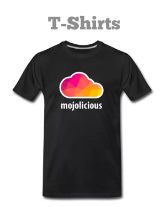It's not just delicious, it's Mojolicious!
mojo.js was designed by a team with decades of experience developing the Mojolicious and Catalyst web frameworks, utilizing the latest web standards and technologies. Providing performance and stability for mission critical web services you can rely on, today and in ten years from now.
Join us, and be a part of a friendly and knowledgeable community of developers that have been around since the early days of the web, and has built some of the largest websites along the way!
Features
- 3x faster than Express.js and 15x faster than Mojolicious.
-
A real-time web framework, allowing you to easily grow single file prototypes into
well-structured MVC web applications.
- Powerful out of the box with RESTful routes, WebSockets, plugins, commands, logging, templates, content negotiation, session management, form and JSON validation, testing framework, static file server, cluster mode, CGI detection, first class Unicode support and much more for you to discover.
-
A powerful web development toolkit, that you can use for all kinds of applications,
independently of the web framework.
- High performance HTTP and WebSocket client/server implementation with support for HTTPS/WSS, cookies, redirects, urlencoded/multi-part forms, file uploads, JSON/YAML, HTML/XML, mocking, API testing, HTTP/SOCKS proxies, and gzip compression.
- HTML/XML parser with CSS selector support.
- No frontend framework, mojo.js is for the backend.
-
Written in TypeScript, with very clean
classandasync/awaitbased APIs. - Very few dependencies, to avoid supply chain attacks and allow for "Perl-grade" long term support and backwards compatibility.
- Fresh code based upon decades of experience developing Mojolicious and Catalyst, free and open source.
Installation
All you need is Node.js 18.0.0 (or newer).
$ npm install @mojojs/coreMaybe take a look at our high quality spin-off projects @mojojs/dom, @mojojs/path, @mojojs/pg and @mojojs/template.
Getting Started
These four lines are a whole web application.
import mojo from '@mojojs/core';
const app = mojo();
app.get('/', ctx => ctx.render({text: 'I ♥ Mojo!'}));
app.start();Use the built-in command system to start your web server.
$ node index.mjs server
[77264] Web application available at http://127.0.0.1:3000/Test it with any HTTP client you prefer.
$ curl http://127.0.0.1:3000/
I ♥ Mojo!Duct Tape for the Web
Use all the latest Node.js and HTML features in convenient single file prototypes like this one, and grow them easily into well-structured Model-View-Controller web applications.
import mojo from '@mojojs/core';
const app = mojo();
app.get('/', async ctx => {
await ctx.render({inline: inlineTemplate});
});
app.websocket('/title', ctx => {
ctx.plain(async ws => {
for await (const url of ws) {
const res = await ctx.ua.get(url);
const html = await res.html();
const title = html.at('title').text();
await ws.send(title);
}
});
});
app.start();
const inlineTemplate = `
<script>
const ws = new WebSocket('<%= ctx.urlFor('title') %>');
ws.onmessage = event => { document.body.innerHTML += event.data };
ws.onopen = event => { ws.send('https://mojolicious.org') };
</script>
`;


